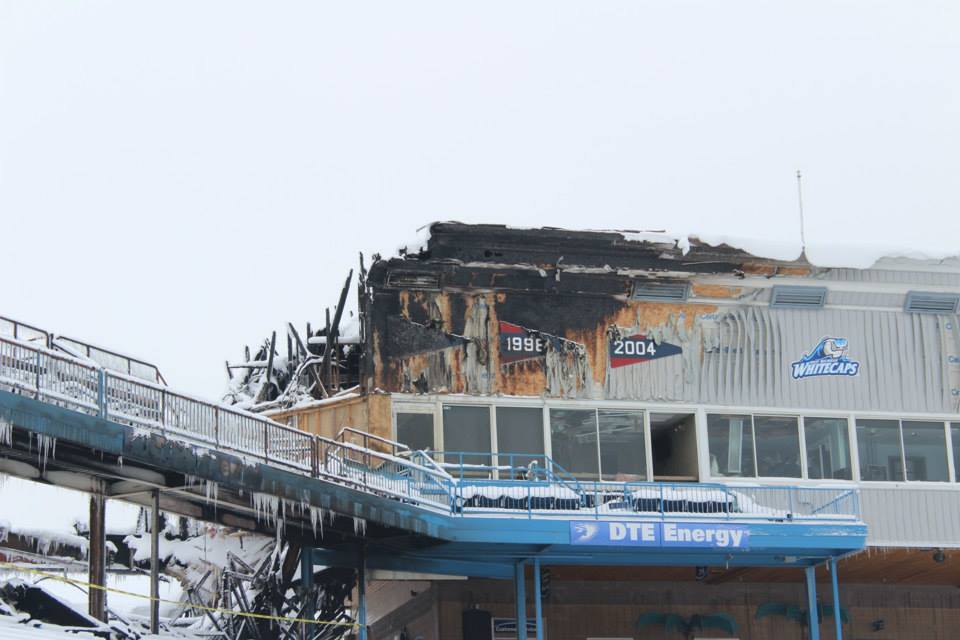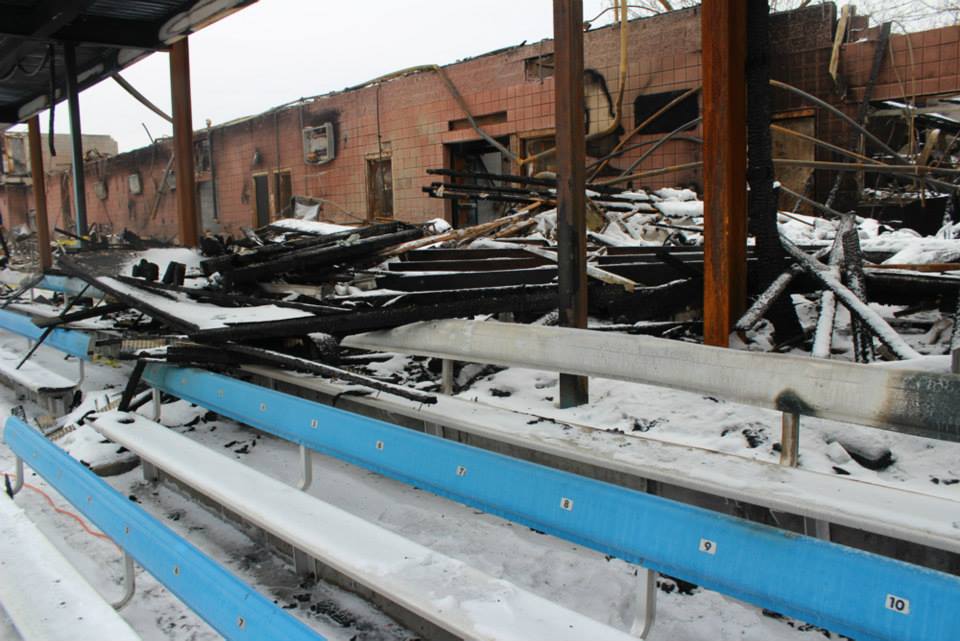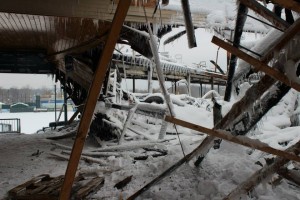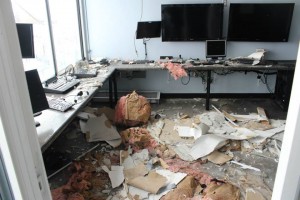Never in Doubt in West Michigan
COMSTOCK PARK, Mich.—It is a month before opening day for the West Michigan Whitecaps of the Class A Midwest League. The drive out of Chicago is part of a search for a new beginning. The Greg Brown CD plays “Never So Far.” A large billboard on the right side of U.S. Route 31 reads “Never In Doubt.”
The sign is in reference to the April 8 Whitecaps opening day.
Nearly half of the team’s 20-year-old ballpark was destroyed in a Jan. 3 fire. Investigators said that a trash container placed next to a space heater in a suite caused the fire. Multiple suites were destroyed and part of the Fifth Third Ballpark roof collapsed. The home clubhouse, right field concession stands and bathrooms were lost. The fire was contained at the first base side of home plate. No one was injured.
The fire caught the imagination of America’s baseball community. When a ballpark goes up in smoke, so do memories and moments. The only major baseball stadium fire I know of is the all-wood Russwood Park in Memphis, Tn. (1896-1960, Elvis played there in 1956] that burned to the ground after an Easter Sunday 1960 exhibition game between the Chicago White Sox and Cleveland Indians.
“There may be nothing as immediate and shocking as seeing a ballpark engulfed in flames,:” Whitecaps CEO/Managing Partner Lew Chamberlain tells me in mid-March. “A ballpark is a symbolic place for a community. Our community feels, and rightly so, that everybody has a little piece of this place. That’s why it becomes a bigger deal than a tool and die shop burning down. It does catch national attention.”
The blaze was extinguished by fire departments from five neighboring communities, including Grand Rapids, about seven miles south of the ballpark. The fire was out in a half hour, according to Mickey Graham, Whitecaps Director of Marketing and Media Relations. He watched the fire from center field. Chamberlain was in Chicago and immediately drove to the scene.
On June 17 the Whitecaps host the 50th Midwest League All-Star Game.
The first goal was to make Fifth Third Ballpark functional by the opening day game against the Wisconsin Timber Rattlers. The second goal is to make everything in tip-top shape by the all-star game. “It’s an opportunity to show off your ballpark,” Chamberlain says. “I wanted everyone in this community and in baseball to be amazed at what we were able to accomplish. We’re very proud of this community and we’re going to do a lot of fun things revolving around our ‘Beer City U.S.A.’ designation, our shore line and everything this region has to offer.” The all-star game logo is a beer label that appears as a mug filled with gold beer and white froth. The Grand Rapids area is a hot spot for the craft beer movement.
Fifth Third features offerings from Founders Brewing and Mitten Brewing (both in Grand Rapids), Perrin Brewery in Comstock Park, New Holland Brewing Company (New Holland), Bell’s from Kalamazoo and Mt. Pleasant Brewing in Mt. Pleasant.
You can bet the Whitecaps will be toasting to Midwest moxie.
“I listened to (Whitecaps president) Scott Lane being interviewed the other day,” Chamberlain says. “He talked how difficult it was to see a place where you spend so much of your time and energy burn to the ground. But he said how quickly his thoughts turned to, ‘What do we do now to get it back?’ That is true of all of us. Yeah, you take a minute to reflect on what an unfortunate circumstance it was, but almost immediately your mind starts working on how we are going to make it better and get it done in three months. In a way that helps you get over your grief.
“There never was a doubt.”
I could phone it in and compose a story by looking at pictures on social media. But by going to the ballpark I see the scope of the damage. I feel it. With the March 11 backdrop of a snowcapped field, scores of workers are toiling up to 12 hours a day rebuilding the clubhouse, video room and suites. Even a few hundred smoke damaged seats along the first base line are in need of being replaced. It still appears to be a daunting task.
Chamberlain, 62, was born and raised in Grand Rapids. (Chamberlain and his Whitecaps co-owner Denny Baxter were also part of the Cougars ownership group in 1991-92.). “We got involved in baseball in the mid-1980s with the idea of bringing minor league baseball to our hometown,” he says. “Little did we know we’d become involved with Kane County along the way.” In 1993 Chamberlain and Baxter purchased and moved the Midwest League’s Madison, Wis. franchise to West Michigan.
Chamberlain has gathered some baseball memorabilia in his journey and much of it was lost due to water and smoke damage in his office. “There’s a lot worse things than losing pictures of Gerry Ford at the ballpark or autographed Ernie Harwell books,” he says. “Nobody was hurt. We’re going to play baseball. What we do every day at the ballpark to me is more important than any piece of memorabilia. I’ve always been an experiential guy. My love of baseball has everything to do with the experiences I share watching baseball. I can’t tell you who hit what for the 1968 Tigers. But I can remember being there with my Dad and my brother. The sharing of baseball is most important to me.”
He did manage to save his most precious item, a papier-machae “Magic 8 Ball” type container made by his son Joe when he was 12 years old. The container came into play in 1997 when West Michigan switched its affiliation from Oakland to Detroit. “I had a lot of respect for Oakland,” Chamberlain says. “Especially in terms of their ideas of community service and getting the ballplayers involved in the community. At the end of the 1996 PDC (Player Development Contract) we won the Midwest League championship with the Oakland affiliation. Joe just wrote the answers out on little cards. It tells you what to do. It was hilarious. I’ll pull a few out.”
And Chamberlain read:
“Let Scott Lane decide.”
“Whatever is best.”
“Call Bill Clinton.”
The container was rescued in early January, albeit wet. He says, “It had to re-papier-machae itself.”
Chamberlain was educated as an attorney and had a grandfather and uncles who were attorneys. “The family heritage nonwithstanding, I didn’t like the practice of law that much, “ he admits. “After a few years I became involved in the family business (Grand Rapids Steel & Supply), which we sold in the mid-1980s. That’s when I turned my attention to baseball.”
Was there any lessons Chamberlain learned in the business world that were applicable to the tragic fire?
“Denny and I spent eight years trying to get baseball off the ground in Grand Rapids,” he answers. “Which means getting a stadium built, financed and the whole nine yards. I learned perseverance. That is the key. We had any number of deals we thought we had put together for baseball in West Michigan and they all went by the boards. But we never gave up because we thought it was a good idea. And fortunately, it turned out to be a good idea.”
Baxter and Chamberlain financed their stadium and they own the ballpark. Ownership reinvests in the park annually, which they wouldn’t be able to do if it was in the public sector.
It took seven figures to rebuild Fifth Third Ballpark (cap. 9,684). The majority of costs were covered by insurance. “All the numbers aren’t in,” Chamberlain says. “But you can safely say that the cost of this repair is going to equal or exceeds the cost of the entire construction in 1994. Even a situation like this provides opportunities. We had been going through a strategic visioning process with the ballpark because it has been part of our DNA and we will continue to reinvest there.” Expect the ballpark to be better than ever.
That’s how dreams roll with these Whitecaps.






Leave a Response